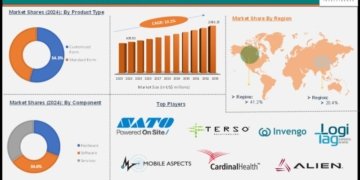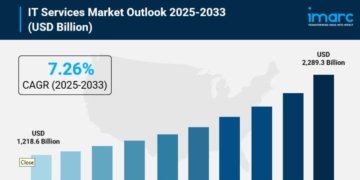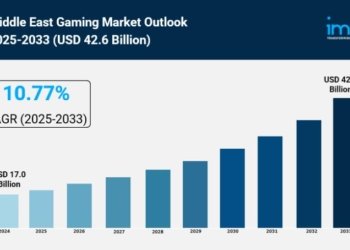Introduction:
The physician scheduling systems market is experiencing rapid growth as healthcare organizations increasingly adopt digital solutions to optimize workforce management. These systems streamline physician scheduling, improve operational efficiency, and enhance patient care by reducing administrative burdens on medical professionals.
As healthcare institutions face rising patient loads, staffing shortages, and regulatory challenges, the need for automated scheduling solutions has become more critical than ever. Physician scheduling systems help hospitals, clinics, and private practices allocate resources effectively while ensuring compliance with labor laws and organizational policies.
This report provides a detailed analysis of the physician scheduling systems market, focusing on growth trends, key drivers, challenges, technological advancements, and regional market dynamics.
Get a Sample PDF Brochure of the Report (Use Corporate Email ID for a Quick Response): http://www.persistencemarketresearch.com/samples/20818
Market Projections and Forecast:
According to Persistence Market Research, the physician scheduling systems market was valued at USD 539.1 million in 2024 and is expected to grow at a CAGR of 15.9%, reaching USD 2,031.1 million by 2033.
The increasing adoption of cloud-based scheduling solutions, artificial intelligence (AI) integration, and mobile accessibility are key factors driving market growth. Additionally, the growing complexity of healthcare workforce management, coupled with an increasing emphasis on operational efficiency, is fueling demand for these systems.
North America is anticipated to lead the market due to its advanced healthcare infrastructure, strong regulatory frameworks, and the presence of key market players.
Market Dynamics:
Drivers of Market Growth:
Rising Demand for Automated Workforce Management
The complexity of physician scheduling, particularly in large hospitals and multi-specialty clinics, has made manual scheduling inefficient. Automated physician scheduling systems help healthcare providers reduce administrative workloads, minimize scheduling conflicts, and improve overall workforce productivity.
Growing Adoption of Cloud-Based and AI-Driven Solutions
The shift toward cloud-based platforms is significantly enhancing the accessibility and scalability of physician scheduling systems. AI-powered scheduling algorithms optimize staff allocation by analyzing historical data, patient demand patterns, and physician availability.
Need for Compliance with Labor Laws and Hospital Regulations
Healthcare organizations must comply with various labor laws, union agreements, and patient safety regulations. Physician scheduling systems automate compliance checks, ensuring adherence to policies related to working hours, shift limits, and fair scheduling practices.
Improved Patient Care and Operational Efficiency
Effective physician scheduling leads to better patient outcomes by reducing wait times, ensuring specialist availability, and improving coordination among medical teams. Efficient scheduling systems also prevent physician burnout, thereby enhancing overall healthcare service quality.
Challenges in the Market:
High Implementation Costs
The initial investment required for deploying advanced physician scheduling systems, particularly for small and mid-sized healthcare providers, can be significant. Costs related to software acquisition, training, and integration with existing hospital management systems may pose financial challenges.
Data Security and Privacy Concerns
As physician scheduling systems handle sensitive data related to physicians, patients, and healthcare institutions, ensuring robust cybersecurity measures is crucial. Data breaches and unauthorized access could lead to compliance issues and legal complications.
Resistance to Technological Adoption
Some healthcare professionals and administrative staff may resist transitioning from traditional scheduling methods to digital platforms due to unfamiliarity or concerns about system reliability. Proper training and change management strategies are essential for successful implementation.
Market Trends and Technological Innovations
AI and Machine Learning Integration
AI-driven physician scheduling systems analyze workload patterns, optimize shift distribution, and predict staffing needs. Machine learning algorithms continuously improve scheduling accuracy based on real-time data inputs.
Cloud-Based and Mobile-Accessible Platforms
Cloud-based scheduling solutions provide flexibility and remote accessibility, allowing physicians to manage their schedules via mobile apps. This trend is particularly beneficial for large hospital networks with multiple locations.
Integration with Electronic Health Records (EHR) and Telehealth
Seamless integration of scheduling systems with EHR platforms and telehealth services enhances coordination between physicians and patients, improving overall healthcare efficiency.
Self-Scheduling and Automated Shift Swapping
Many modern physician scheduling systems now include self-scheduling features, allowing doctors to manage their availability and swap shifts autonomously while maintaining compliance with hospital policies.
Market Segmentation:
By Deployment Type
Cloud-Based Solutions (Leading Segment)
On-Premise Solutions
By Application
Hospital Scheduling
Clinic and Specialty Practice Scheduling
Emergency Room and On-Call Management
By End-User
Hospitals & Healthcare Institutions
Independent Physician Practices
Medical Staffing Agencies
Regional Analysis:
North America
North America dominates the physician scheduling systems market due to advanced healthcare IT infrastructure, a strong focus on workforce management, and stringent regulatory requirements. The U.S. leads in adoption, with major hospitals implementing AI-driven scheduling platforms.
Europe
The European market is expanding due to government initiatives promoting digital healthcare transformation. Countries such as Germany, the UK, and France are investing in smart hospital solutions, including automated physician scheduling.
Asia-Pacific
The Asia-Pacific region is witnessing rapid adoption, particularly in emerging markets like India and China, where healthcare facilities are modernizing to meet growing patient demands. Increasing investments in telemedicine also contribute to market growth.
Middle East & Africa
The market in this region is gradually developing, with a focus on improving healthcare workforce efficiency and addressing physician shortages.
For In-Depth Competitive Analysis, Buy Now @ https://www.persistencemarketresearch.com/checkout/20818
Key Companies Profiled in the Report:
Kronos Incorporated (UKG)
QGenda
AMiON
Shift Admin
Intrigma
Lightning Bolt Solutions
TigerConnect
Mediware Information Systems
MDsyncNET
Epic Systems Corporation
These companies are investing in AI-powered automation, mobile integrations, and cloud-based platforms to enhance scheduling efficiency.
Future Outlook:
The physician scheduling systems market is set to grow significantly over the next decade, driven by digital transformation in healthcare. Key trends such as AI automation, mobile accessibility, and EHR integration will shape market developments.
As hospitals and healthcare providers strive to improve workforce management and patient outcomes, physician scheduling systems will play a critical role in optimizing operational efficiency. However, addressing challenges related to implementation costs, data security, and resistance to change will be essential for widespread adoption.
With a CAGR of 15.9% from 2024 to 2033, the market presents substantial opportunities for software providers, healthcare institutions, and investors. Companies that prioritize innovation, compliance, and seamless integration will be well-positioned for long-term success.
Conclusion:
The physician scheduling systems market is a rapidly evolving segment of healthcare IT, providing essential solutions for optimizing workforce management. Growth is being driven by increased demand for automation, compliance with labor regulations, and advancements in cloud-based technology.
Despite challenges such as high implementation costs and data security concerns, the market’s long-term outlook remains positive. The transition to AI-driven, cloud-based scheduling solutions will continue to reshape physician workforce management, ultimately improving healthcare efficiency and patient care outcomes.
As healthcare institutions increasingly prioritize digital transformation, the physician scheduling systems market will emerge as a critical component of future-ready healthcare operations.
Read More Trending “PMR Exclusive Article”:
• https://prnewssync.medium.com/business-process-automation-market-growth-trends-and-insights-447140421f12
• https://techxpresstoday.wordpress.com/2025/01/28/business-process-automation-market-driving-digital-transformation/
• https://apsnewsmedia.blogspot.com/2025/01/business-process-automation-market.html
• https://www.manchesterprofessionals.co.uk/article/marketing-pr/81225/business-process-automation-market-key-players-and-strategies
• https://vocal.media/stories/business-process-automation-market-top-benefits-for-organizations
Contact Us:
Persistence Market Research
G04 Golden Mile House, Clayponds Lane
Brentford, London, TW8 0GU UK
USA Phone: +1 646-878-6329
UK Phone: +44 203-837-5656
Email: sales@persistencemarketresearch.com
Web: https://www.persistencemarketresearch.com
About Persistence Market Research:
At Persistence Market Research, we specialize in creating research studies that serve as strategic tools for driving business growth. Established as a proprietary firm in 2012, we have evolved into a registered company in England and Wales in 2023 under the name Persistence Research & Consultancy Services Ltd. With a solid foundation, we have completed over 3600 custom and syndicate market research projects, and delivered more than 2700 projects for other leading market research companies’ clients.
Our approach combines traditional market research methods with modern tools to offer comprehensive research solutions. With a decade of experience, we pride ourselves on deriving actionable insights from data to help businesses stay ahead of the competition. Our client base spans multinational corporations, leading consulting firms, investment funds, and government departments. A significant portion of our sales comes from repeat clients, a testament to the value and trust we’ve built over the years.
This release was published on openPR.


















